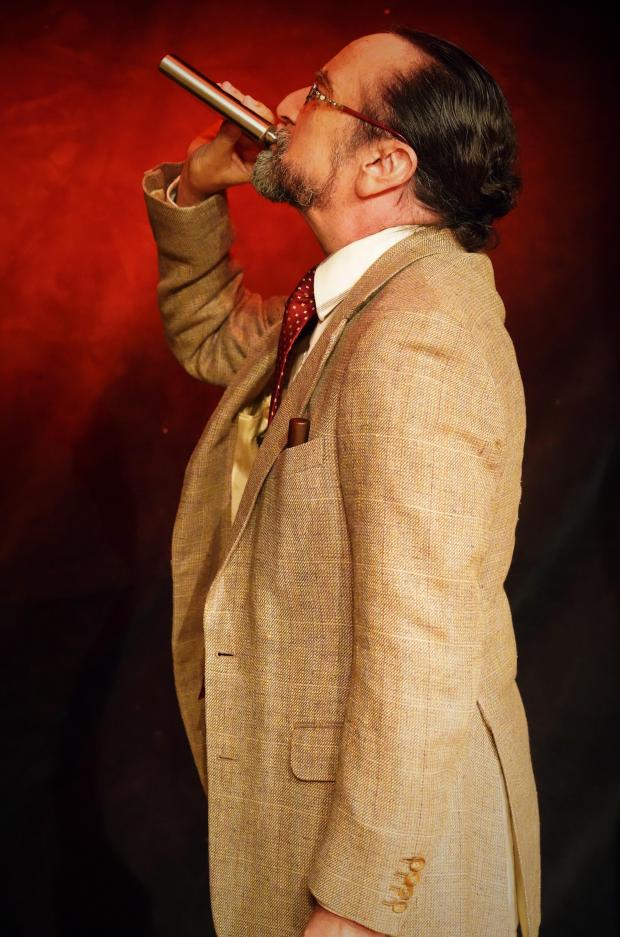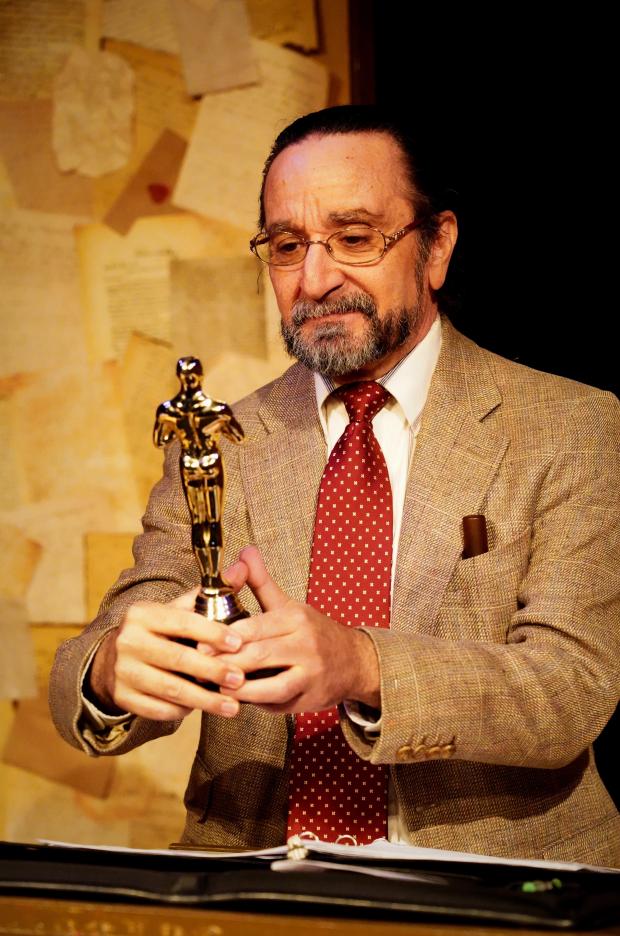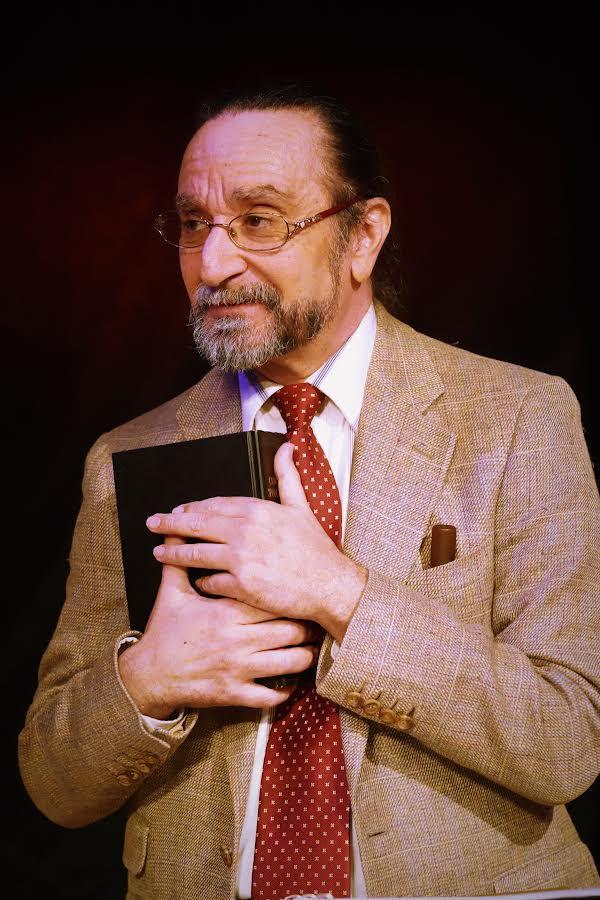Advertisement
Playwright Willard Manus’ The Funny Man is a one-man show starring Sam Aaron as the Oscar-winning humorist S. J. Perelman, who The New York Times called “an artist whose nonpareil gift of ridicule, dazzling verbal effects, polished style, and keen observation made him a unique and precious figure in our literature.” The conceit of this solo show is that Perelman has been invited to the University of California at Santa Barbara in order to deliver a lecture on creative writing in 1976, when the screenwriter/playwright/author/essayist was 72. The Brickhouse Theatre’s stage is adorned by Zad Potter with a lectern, from which Aaron as the ersatz Perelman holds forth on the literary life, as well as Hollywood, Broadway, comedy, monogamy, travel, The New Yorker magazine and about what one suspects is the guest lecturer’s favorite subject: Himself.
Certain theatergoers may find this threadbare, conventional, straight forward mode of presentation to be tiresome and lacking in originality. In some one-man shows the actor incarnates as a variety of different characters (think the protean Anna Deavere), but The Funny Man focuses mostly on Perelman himself, although occasionally he’ll briefly break character and, say, impersonate Groucho Marx chomping on a stogie and wisecracking.
However, as a movie historian, I enjoyed The Funny Man and learning about the screenwriter of the Marx Brothers’ early 1930s’ hits, Monkey Business and Horse Feathers, whom I had known little about prior to viewing this highly informative, mildly entertaining play. The raconteur spins anecdotes galore about the luminaries he was lucky enough to have rubbed shoulders with, from Tinseltown to the Great White Way and beyond. The namedropper’s prey include:
Nathaniel West, the ill-fated author of Miss Lonelyhearts and The Day of the Locust, (which John Schlesinger rather memorably adapted for the screen in 1975; see: https://www.imdb.com/title/tt0072848/?ref_=nm_flmg_wr_3), who was a particularly close friend of Perelman’s. S.J. describes MGM as “an assembly line” with “200 writers on contract,” and quotes the studio’s “wunderkind,” Irving Thalberg, as calling writers “a necessary evil.” L.B. Mayer, MGM’s imperious mogul, refined this to “writers are schmucks with Underwoods” (or was that bon mot uttered by another Tinseltown tyrant?).
Perelman mourns the untimely death of F. Scott Fitzgerald, whom he held in high esteem as a peerless scribe, along with literati such as W. Somerset Maugham. He also regales us with tales of Groucho, Herman Mankiewicz or “Mank” (co-author of 1941’s immortal Citizen Kane) and the rascally producer Mike Todd, who somehow finagled a marriage to Elizabeth Taylor – and an Oscar for S.J., who co-wrote the 1956 Todd-produced extravaganza Around the World in 80 Days. (From time-to-time Aaron/Perelman waves said Oscar around and the famed theme from Around the World in 80 Days is played to make sure everyone remembers what a celebrated writer he is.)
But as a film historian, the historical figure Perelman recounts who interested me most was the Serbian-born Slavko Vorkapich, who went to Hollywood and created countless montage sequences in movies such as 1937’s The Good Earth and Frank Capra’s 1941 Meet John Doe. Vorkapich is a little known, underrated talent who kept the cinematic art of editing with rapid cuts alive after the advent of talkies, and my hat is off to playwright Willard Manus for reminding audiences about this overlooked yet important artist who expressed the quintessence of cinematic attributes.
During his “lecture,” Perelman also dispenses pearls of wisdom to the UCSB students/ Brickhouse Theatre audience. This includes the eponymous funny man’s gem: “Humor is an angry business.” And that it is the humorist’s role to “deflate pretentiousness.” Perelman also discusses his private life, marriage, various sexual peccadilloes and life at his 80-acre spread in Bucks County, Pennsylvania. Crafting comedic essays for The New Yorker is also remembered. A prime example of his wit is the 1944 sendup of noir literature and Raymond Chandler, Farewell, My Appetizer (see: https://github.com/poritsky/A-Treasury-of-PDFs/blob/master/Perelman%2C%20S.%20J./1944-12-16%20%E2%80%93%20Farewell%2C%20My%20Lovely%20Appetizer.pdf ).
Because I was unfamiliar with both Perelman and Aaron, it’s hard for me to determine how crackerjack a job the actor performs in terms of realistically rendering the writer. But here’s a description of the auteur penned by George Plimpton and William Cole in their introduction to an interview with S.J. in the Summer-Fall 1963 issue of The Paris Review:
“Mr. Perelman, trim and well-tailored, is of medium build. His hair is gently receding, and graying at the temples. He wears old-fashioned steel-rimmed spectacles, bought in Paris many years ago. He is soft-spoken and reserved, sometimes chilling, and gives the impression that he does not suffer ‘nudnicks’ gladly. He cares about words in their proper places; in his speech each sentence emerges whole and well-balanced, and each generally contains one or two typically Perelmanesque words. He is impatient with obvious questions—those that he has been asked over and over again in hundreds of interviews—but lights up when talking about his days in Hollywood, or telling anecdotes about his friend Robert Benchley. As The Listener put it, reporting on a television interview, ‘Mr. Perelman knew all the answers and gave such as he chose.’” (see: https://www.theparisreview.org/interviews/4536/the-art-of-fiction-no-31-s-j-perelman.)
Judith Rose deftly directs Aaron into delivering a droll characterization of a Perelman who does indeed resemble the wordsmith as etched above. In a nod to Kurt Cobain, let’s call this depiction a “Perelman Jam.”
With this world premiere, once again playwright emeritus Willard Manus dramatizes the life of yet another notable to help ensure they don’t slip into the mists of historical obscurity. Previously, Manus recounted the lives of the legendary CBS broadcaster Edward R. Murrow (my namesake); interviewer par excellence Oriana Fallaci and Greek freedom fighter Alexandros Panagoulis; jazz myth Charlie Parker; and wrote the play and co-wrote the screenplay for the 2018 biopic Frank & Ava, about the tumultuous love affair between Sinatra and Gardner; et al.
Manus’ bioplay about S.J. Perelman is recommended for ticket buyers interested in, but of course, Perelman himself; the creative process of writing; the art and craft of comedy; bioplays; Hollywood history; one-man shows; and lest we forget, UCSB alumni. As Perelman himself insisted: “The main obligation is to amuse yourself.”
The Funny Man is presented by Write Act Repertory and being performed at 8:00 p.m. on Saturdays and on Sundays at 1:30 p.m. through July 17, 2022, at The Brickhouse Theatre, 10950 Peach Grove St., N. Hollywood, CA 91601 (off Vineland, just north of Camarillo). Tickets and info: https://thefunnyman.bpt.me; (800)838-3006 (ext. 1). Covid documents are checked for admission and masks are required to be worn.



